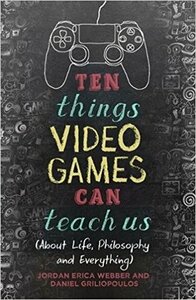Take a photo of a barcode or cover
10 reviews for:
Ten Things Video Games Can Teach Us: (about life, philosophy and everything)
Jordan Erica Webber, Daniel Griliopoulos
10 reviews for:
Ten Things Video Games Can Teach Us: (about life, philosophy and everything)
Jordan Erica Webber, Daniel Griliopoulos
informative
reflective
slow-paced
informative
reflective
slow-paced
Oh boy, this took me a while to read. I thought I had enough base prior knowledge to understand, but I really didn't. Aside from that, I should have been able to engage with the content regardless right? Wrong. It wasn't the content so much as the writing. It was very much academic writing, which, fine, I went to university, I know how to read academic writing, but because of that, I felt like I really had to work to understand what was being discussed. Which maybe is my bad for assuming that I would not be reading such writing in a book, but I honestly think that the writing would have been better suited in an academic journal.
However, to give credit where credit is due. This book sparked conversations, and once I started having these conversations about the topics within the book, it became a lot easier to get through.
Wouldn't recommend, wouldn't read again.
However, to give credit where credit is due. This book sparked conversations, and once I started having these conversations about the topics within the book, it became a lot easier to get through.
Wouldn't recommend, wouldn't read again.
A great exploration of various philosophical topics. The use of video games as thought experiments or even just as ways of demonstrating a concept was engaging; I've even added some of the mentioned games to my wish list (also, just to be clear, there are spoilers within the book -- the plot does need to be explained for the philosophy to be explored). I particularly liked the chapters seven and eight (which was on moral systems). Additionally, the chapter on virtual reality served to introduce me to a view I had not yet considered before which is always fun.
My least favourite chapters were the last two which, at least in my eyes, took on a more... one-sided stance. With the other chapters being sure to explore as many sides as possible without becoming their own books, the chapter on politics (to a lesser degree) and the chapter on death (to a greater degree) felt biased. Arguing your own opinion is all well and good, but when the rest of the book is neutral it feels out of place. And since the last chapters were what I read, well, last that impression stuck (hence the 4/5 instead of the 5/5).
However, its sill a fantastic read with many fascinating insights. It serves as an interesting introduction to philosophy; I'm definitely going to need to reread it sometime.
My least favourite chapters were the last two which, at least in my eyes, took on a more... one-sided stance. With the other chapters being sure to explore as many sides as possible without becoming their own books, the chapter on politics (to a lesser degree) and the chapter on death (to a greater degree) felt biased. Arguing your own opinion is all well and good, but when the rest of the book is neutral it feels out of place. And since the last chapters were what I read, well, last that impression stuck (hence the 4/5 instead of the 5/5).
However, its sill a fantastic read with many fascinating insights. It serves as an interesting introduction to philosophy; I'm definitely going to need to reread it sometime.
I wrote half of it, so you should totally discount this review.
This book is, ostensibly, a beginners crash course on theoretical philosophy. The 'Ten Things' are not as clearly delineated as the title suggests - why must every non-fiction book strive for Buzzfeed clickbait titles, now? I appreciate the exception.
I felt rather condescended, because I actively think about and reflect on the games I play, and so I didn't really learn anything about a single game mentioned (of which I've played 90%+). Jordan and Daniel basically summarise interesting contemporary (mostly, rightfully, indie) games. You could read the Wiki articles and make the same conclusions.
Tim Rogers's videos will help you learn about video games, and our relative dispositions to them as art (or umwelts, reality mirrors reflecting ourSelves). Hell, YouTube in general offers a more profound array of insights into video game philosophy while providing footage.
I felt rather condescended, because I actively think about and reflect on the games I play, and so I didn't really learn anything about a single game mentioned (of which I've played 90%+). Jordan and Daniel basically summarise interesting contemporary (mostly, rightfully, indie) games. You could read the Wiki articles and make the same conclusions.
Tim Rogers's videos will help you learn about video games, and our relative dispositions to them as art (or umwelts, reality mirrors reflecting ourSelves). Hell, YouTube in general offers a more profound array of insights into video game philosophy while providing footage.
informative
inspiring
medium-paced
informative
reflective
medium-paced
An accessible introduction to philosophical concepts such as utilitarianism and both uses games to explain them and explains how games utilise them for storytelling, or to conveys themes the creators wish to put across. Highly recommended for those looking to delve deeper into the thinking behind a number of recent games or for those looking to get into philosophy.
Good but not for me
Marking this as done without finishing it. As well written and entertaining a bit of pop philosophy as I've seen, but not really the book for me. Would definitely recommend this as an introductory text for anyone interested in philosophy but not sure how or where to start
Marking this as done without finishing it. As well written and entertaining a bit of pop philosophy as I've seen, but not really the book for me. Would definitely recommend this as an introductory text for anyone interested in philosophy but not sure how or where to start





